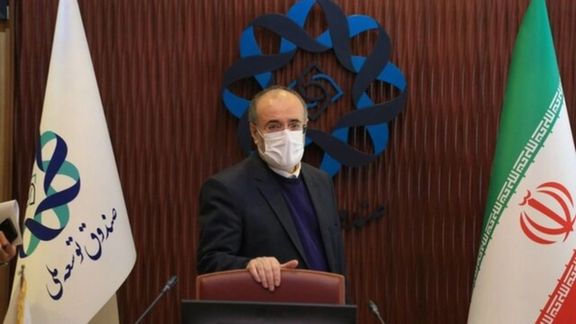Iran Wealth Fund Chairman Slams Politicians For ‘Cash Withdrawals’

As Iran’s economic woes continue, the manager of its sovereign wealth fund has criticized successive governments for bad planning and treating the fund as an ATM.

As Iran’s economic woes continue, the manager of its sovereign wealth fund has criticized successive governments for bad planning and treating the fund as an ATM.
In a gathering of senior officials on Tuesday, Mehdi Ghazanfari, a graduate of Australia’s University of New South Wales (Sydney) lashed out at ministers and civil servants for drafting unbalanced budgets and then running to Iran’s National Development Fund (NDF) for money.
Ghazanfari, the fund’s chairman, complained that at the end of each year, the presidential administration and parliament spend at least three months drawing up and debating a new budget, “but in the end whatever they plan includes a budget deficit and they turn to NDF.”
Since its establishment in 2000 as a currency reserve to supplement the Oil Stabilization Fund, successive governments have dipped into the NDF for current spending, including the withdrawal of the equivalent of 2 billion euros in 2019 to boost defense spending. The administration of President Mahmoud Ahmadinejad (2005-13) borrowed heavily from the fund, which contained $24 billion when he was elected. The populist president withdrew $2.7 billion to pay New Year cash handouts to all Iranians in 2013.
While the fund was originally intended to net 20 percent of Iranian oil income – a target subsequently increased to 40 percent – United States ‘maximum pressure’ sanctions introduced in 2018 reduced Iran’s oil exports from over 2.5 million barrels a day (bpd) in 2017 to around 650,000 bpd in 2021. In two years of deep recession 2019-2020, the government raided the fund to finance spending, introducing a veil of secrecy around reserves.
‘Go To Mr Kazemi if you need money’
Claiming there had been a recent request from an unnamed minister for close to $1 billion, Ghazanfari asked why the government needed extra cash so early in the fiscal year, which began March 21.“If you need money for operational or developmental budgets, go to Mr [Masoud Mir] Kazemi [head of the Planning and Budget Organization],” Ghazanfari quipped. He also argued the government could borrow from banks.
Ghazanfari called for a consistent approach based on realistic targets. “When you say NDF’s share from oil revenues is 40 percent, then allow it to remain 40 percent and don’t mess with it in the middle of the year,” he said. “If there are sanctions and you cannot deposit money in the fund, then don’t deposit [in the first place].”
President Ebrahim Raisi’s government has claimed credit for higher oil exports despite US sanctions and has insisted the proceeds have reached Iran, despite US banking sanctions threatening punitive action against any third party dealing with Iran’s financial sector.
The Wall Street Journal recently estimated that Iran's oil exports, going mainly to China, had risen to 870,000 barrels a day in the first three months of 2022, up around 30 percent from an average 668,000 bpd in full-year 2021. But the falling rial – losing 20 percent of its value in the past two months – suggests there has been no great influx of foreign currency.
A money request from NDF means the government is short of cash, which puts the claims about higher oil revenues in doubt. This can also be surmised from the falling exchange rate for Iran’s currency, rial. In the past two months, the rial has fallen from 250,000 to 300,000 against the US dollar, a 20 percent decline.
It was perhaps in this context that Ghazanfari mentioned a minister asking for close to a billion dollars from NDF.